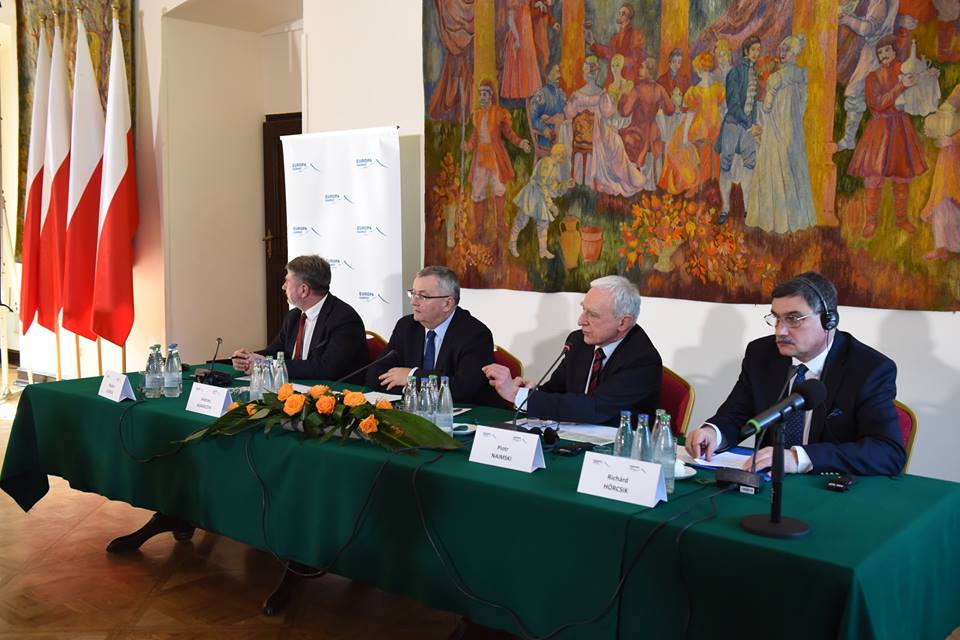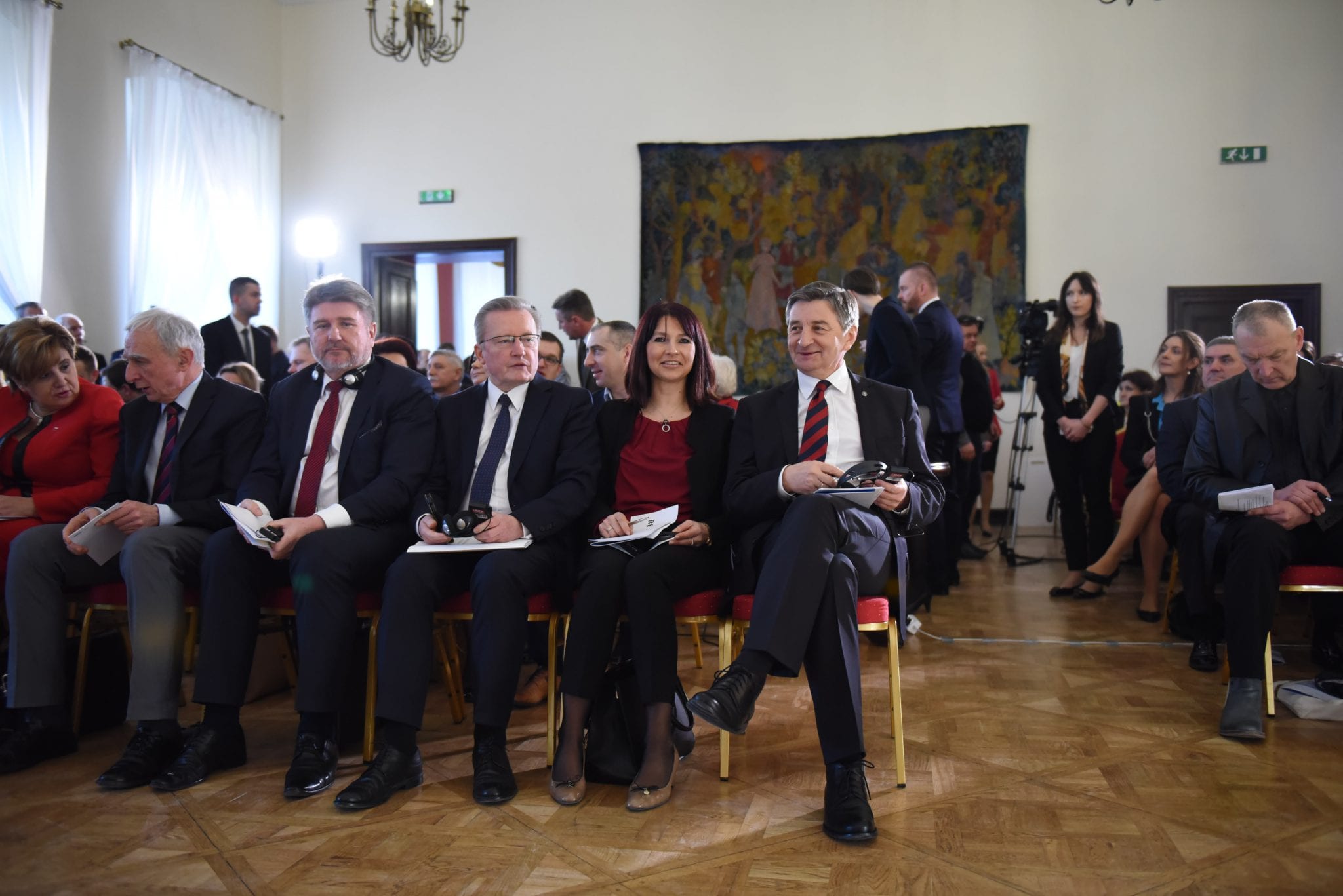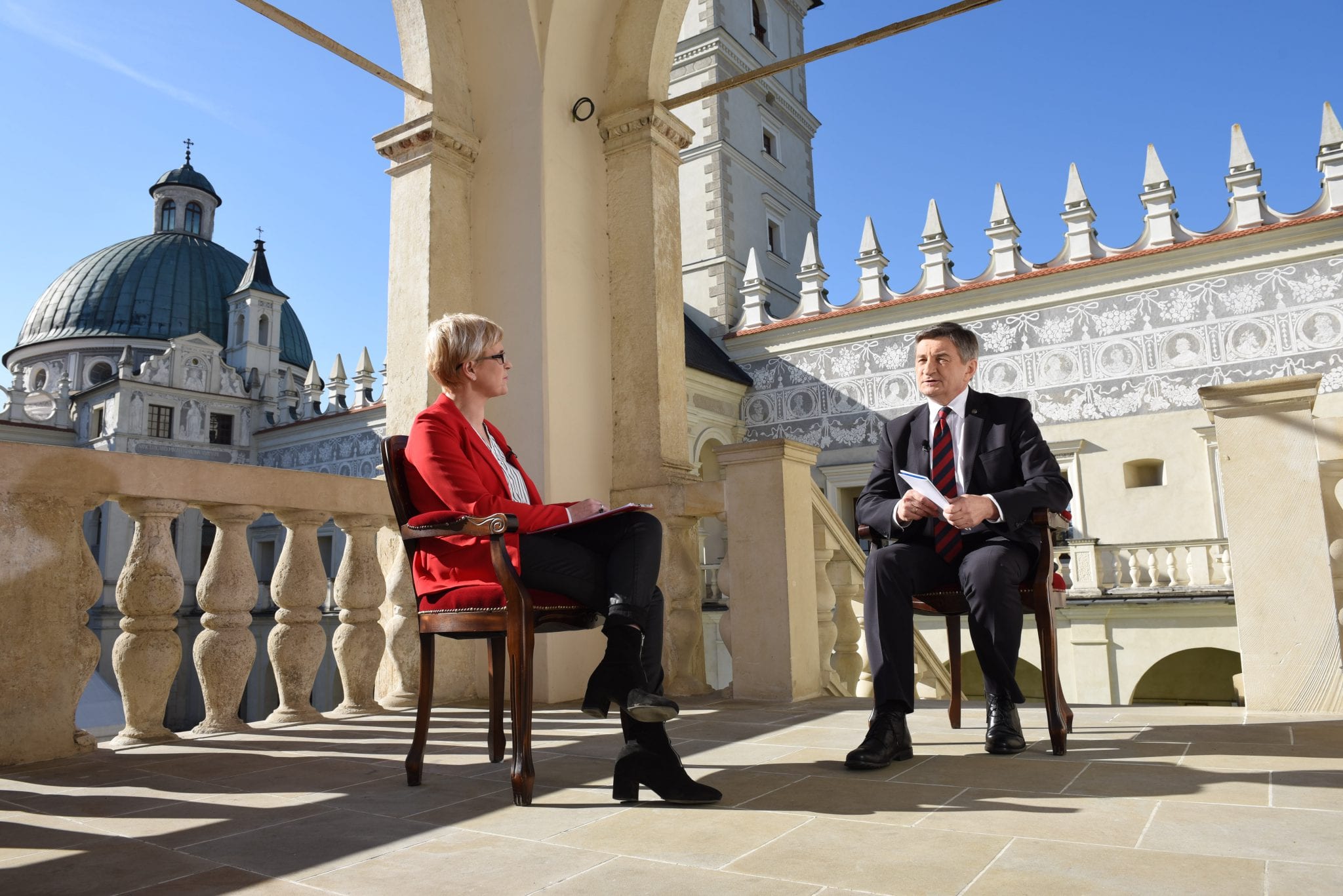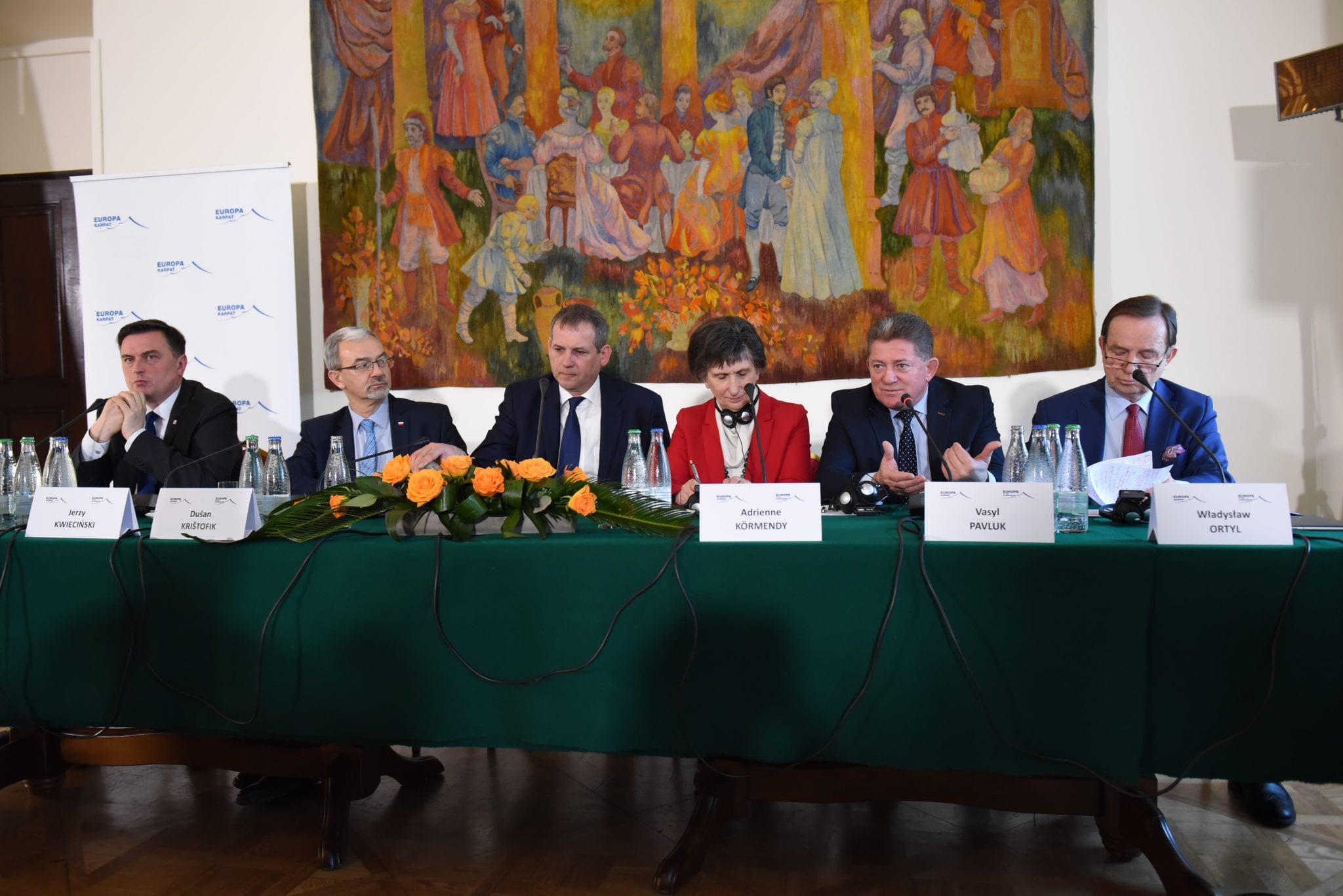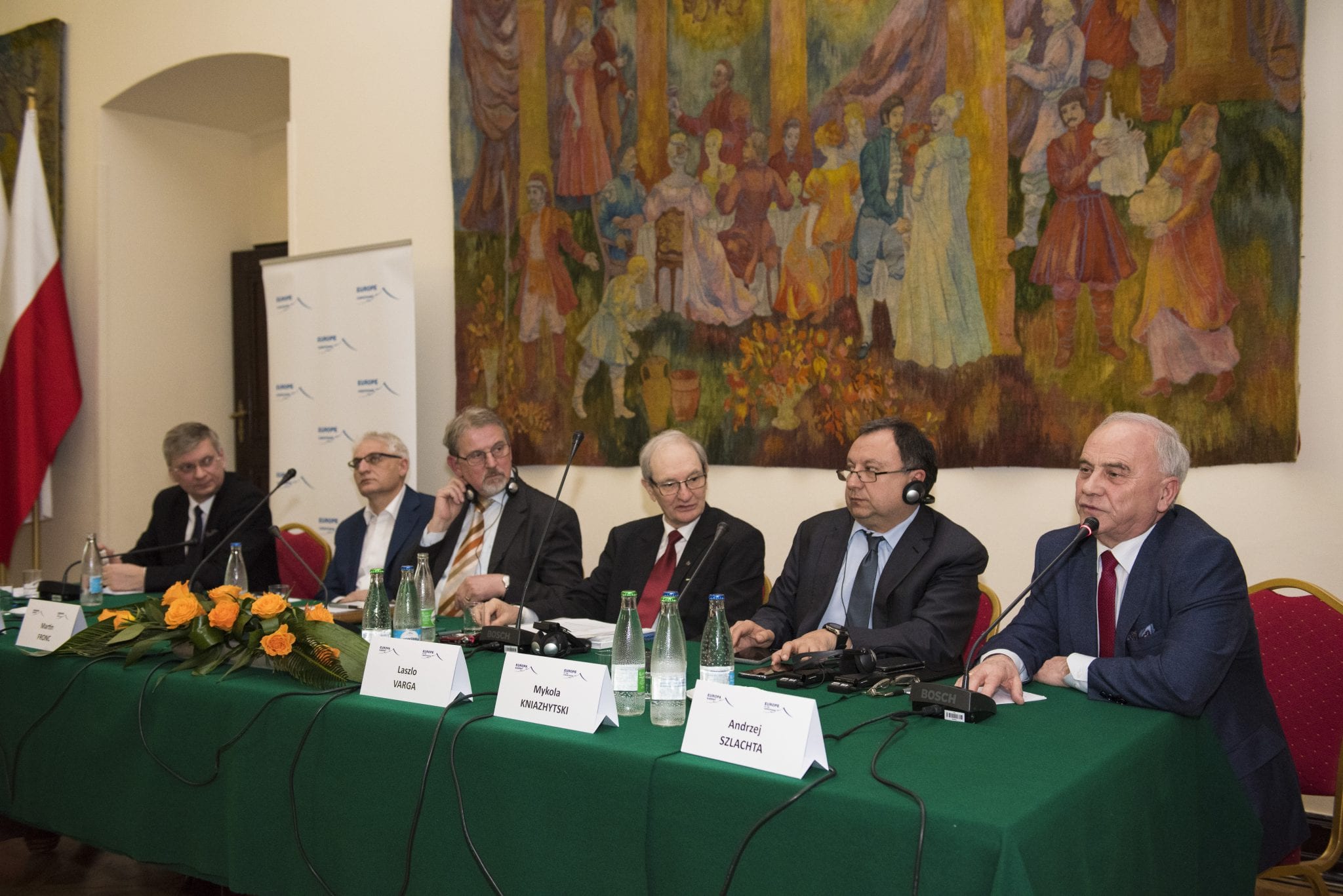Dozens of guests from abroad, experts, local government officials, as well as ministers of the Polish government - the 22nd "Europe of the Carpathians" conference, which took place on Saturday and Sunday in Krasiczyn in the Podkarpacie region, was one of the most important international political events in this part of the continent in 2019.
A series of meetings initiated and hosted by the Speaker of the Sejm Marek Kuchciński, this time was devoted mainly to the issues of infrastructure and investment. - Despite the fact that almost 30 years have passed since the changes in 1989, there is still a lot to be done in terms of road and railroad connections. The number of border crossings between the Carpathian countries is also insufficient - said the Speaker of the Sejm in his speech at the Conference. Marek Kuchciński also told the guests from Hungary, Slovakia, Ukraine and Romania that the North-South infrastructure in its broad sense is still "ten times less developed than the similar one west of the Odra". - It is common to say "I'm going to the Alps" and not to Germany, Austria or Switzerland. I wish that by increasing cooperation and integration between the countries of our region we could talk about the Carpathians in a similar way in the future" - Marshal Kuchciński appealed to the participants.
One of the issues discussed was the Carpathian College, a forum for cooperation between higher education institutions. - It would enable not only scientific cooperation, but also exchange and education of young people. This is an element of the network - a whole system complementing the political and economic cooperation, and at the same time a place for shaping young leaders - said Marek Kuchciński. Speaker of the Sejm also referred to the discussion about the future seven-year budget perspective of the EU and stressed that the issue of 'Carpathian Europe' should be introduced to the agenda of the European Union. - I will try to prepare soon, with the support of prime ministers and parliaments of the Carpathian countries, an exhibition on 'Europe of the Carpathians' and organize several conferences in Brussels - declared Speaker Kuchciński.
The guests of the second day of the conference included Minister of Investment and Development Jerzy Kwieciński, Minister of Infrastructure Andrzej Adamczyk, Secretary of State in the Chancellery of the Prime Minister Piotr Naimski, Marshal of the Podkarpackie Region Władysław Ortyl, as well as guests from abroad, including Richárd Hörcsik, Chairman of the EU Affairs Committee of the Hungarian National Assembly.
- We want the Carpathians to be included in the macro-regional strategy. This is the most advanced element of the regional policy of the European Union - assessed Minister Kwieciński, who at the same time stressed that it is about actions based on the EU platform, following the example of similar existing ones. He reminded that Poland has been promoting the idea of the Carpathian Strategy since 2011. - We need cooperation across the Carpathians. We need cooperation across the Carpathians, so that the Carpathians connect us, as they did a few centuries ago. To this end, we take formal, joint action at the EU level. We are prepared for this - emphasized Jerzy Kwieciński.
During the panel discussion on history and tourism it was emphasized that the Carpathians are a place where the people have a special attachment to the traditions of their ancestors, which is reflected in the culture of the region and should be the foundation of common tourist initiatives. - It is important to base tourism in the Carpathians on history, on cultural heritage, on the wealth that already exists in the Carpathians and that is already happening. We must not forget about the communication infrastructure, which is important for the development of the area," said Ortyl.
The last panel discussion entitled "Infrastructure of Central Europe" was devoted to energy and communication. During the discussion it was emphasized that road investments are of key importance for regional development and strengthening cooperation between the countries of Central and Eastern Europe. As an example was given the Via Carpatia route, which is to connect the north of Europe with the south, Tallinn with Thessaloniki, at the same time including less developed regions in the main stream of international exchange. Minister Adamczyk, speaking about Via Carpatia, pointed out that this is the road that Belarus, Ukraine and the Balkan countries are waiting for. - We can clearly state: Europe is convinced that Via Carpatia is the road needed by the countries of Central and Eastern Europe, especially those based on the eastern border of the European Union. This road will be a generator of development - emphasized the Minister of Infrastructure. - This initiative of the 12 countries of the region is already beginning to be perceived as an opportunity to communicate, establish positions and political tactics on the EU forum. The Carpathians are the core of this cooperation, without them it is impossible - said Piotr Naimski.
The weekend Conference was already the 22nd meeting of the "Carpathian Europe" series. The event has been organized for 12 years. Previously, the conferences were held, among others, in Krynica-Zdrój, Przemyśl, but also in Hungary and Ukraine.
On the first day of the conference Ewa Leniart, Voivode of Podkarpacie, reminded that the idea of meetings dates back to 2007, when on the initiative of then MP Marek Kuchciński the first meeting of parliamentarians of the Carpathian countries was held. - This event has become a forum for exchanging ideas, source of initiatives, but also a field for strengthening cooperation between us, our neighbors, for whom the common mountains - the Carpathians - have for centuries been a source of common historical and cultural experience, but also a natural determinant of economic development - assessed Ewa Leniart.
On the first day of the event the speakers discussed the history of the Carpathian countries and the discussion was inaugurated by the panel "The common heroes of freedom", moderated by the director of the Wacław Felczak Institute for Polish-Hungarian Cooperation, Prof. Maciej Szymanowski, advisor to the Speaker of the Sejm. - We deal with history not to know what happened but to know what will happen. Without the knowledge of what happened - it concerns people, phenomena - it is very difficult for us to predict what will happen," said Prof. Szymanowski. In his opinion the common history of the nations of this part of Europe should be promoted on many levels. - We should pay attention to what to invest in, look for cooperation and support cooperation with Western and American scientific circles. We should convey to them our view of the world, which we can agree or disagree with, but it should at least be noted and taken into account," he argued.
In this context, the Hungarian historian Laszlo E. Varga recalled the participation of his compatriots in the Polish Legions of Józef Piłsudski. Whereas Martin Fronc, the former Minister of Education and former member of the Slovak National Council, pointed out that the heroes who fought against the communist regime are mostly unknown today. - We must remember our common heroes of freedom - appealed the Slovak politician. The discussion was concluded by Andrzej Szlachta, MP, who pointed to the Poles as a nation that influenced the fate of the entire Central and Eastern Europe with its ambitions for freedom. - I would like to evoke a collective hero. 10 million Poles, who in 1980 united with one aim: to change Poland, fighting for a free, democratic homeland - he said.
The second panel entitled "On the Paths of Sages - about the future of Central Europe" was devoted to the discussion of the scientific community on university-educational cooperation conducted through academic centers of Carpathian countries. The practical dimension of this cooperation was discussed, referring to the establishment of Collegium Carpaticum - an agreement of universities from the Carpathian region: Czech Republic, Slovakia, Hungary and Poland, as well as Ukraine and Romania. The moderator of this part of the discussion was Jan Malicki, Director of the Study of Eastern Europe at Warsaw University and advisor to the Speaker of the Sejm, and the speakers included: Renáta Tomášková, Vice-Chancellor of the University of Ostrava; Peter Káša, Program Coordinator of Collegium Carpathicum at the University of Prešov; Sándor Őze - Director of the History Institute at the Catholic University of Budapest and Sławomir Solecki, Vice-Chancellor of the State Eastern European University in Przemyśl.
At the end of the first day of the conference the head of the Poland-Belarus-Ukraine Programme office in Rzeszów Alicja Wosik-Majewska presented the assumptions of the project, which has the largest cross-border programme on the EU land borders in terms of budget. In the current financial perspective over 170 million euros will be allocated for grants from this program. They will provide co-financing for projects concerning the protection and promotion of cross-border cultural and natural heritage, increasing the accessibility of the regions, improving infrastructure and services at border crossings, and developing health and social services. The programme benefits inhabitants of four Polish voivodships: Podkarpackie, Lubelskie, Podlaskie and the eastern part of Mazowieckie, as well as four regions from Belarus and six from Ukraine.
CIS text
Photo by Marta Marchlewska


